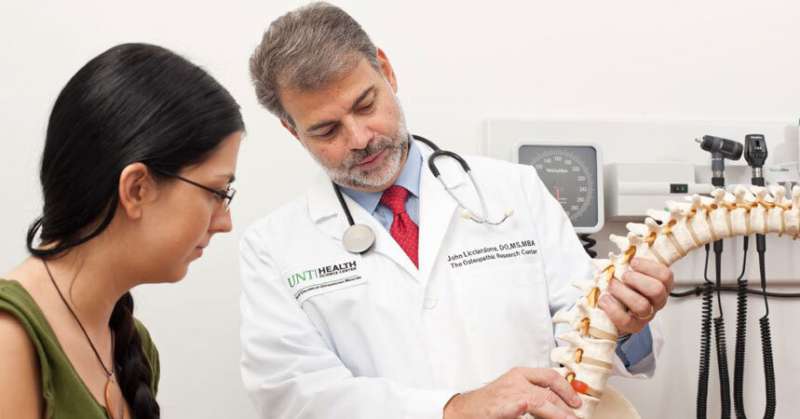Research shows TCOM and osteopathic approach making a difference

Osteopathic medicine's emphasis on physician empathy and understanding leads to higher patient satisfaction, a study by researchers at UNTHSC's Texas College of Osteopathic Medicine indicates.
The 2 ½ -year study, conducted by the PRECISION Pain Research Registry and TCOM's John Licciardone, DO, MS, MBA, reaffirmed the importance of empathy and better interpersonal manner when treating patients with chronic pain.
Third-year TCOM student Monika Schmitt, a PRECISION Clinical Research Fellow, helped craft the article published in the Journal of the American Osteopathic Association.
"The greater levels of physician empathy and the better interpersonal manner reported by patients who were treated by osteopathic physicians may be important mediators of clinical outcomes in people with chronic pain," Dr. Licciardone said. "That patients of osteopathic physicians reported lower levels of pain catastrophizing and were more resilient and better able to cope with their pain may explain their lower levels of disability."
Focusing on interpersonal manner, empathy and communication style, the results of the study showed patients seeing osteopathic physicians had more favorable perception of their treatment. In keeping with some of the foundational osteopathic tenants—such as the body is capable of self-regulation and self-healing—the study illustrated that DOs were less likely to prescribe opioids.
The results also raise awareness of the burgeoning opioid crisis and how osteopathic physicians can help decrease potential addiction to opioids.
"Our results show that osteopathic physicians are less likely to prescribe opioids or nonsteroidal anti-inflammatory drugs for their patients with pain," Dr. Licciardone said. "Thus, osteopathic philosophy and medical care is very consistent with current guidelines from the Centers for Disease Control and Prevention, which emphasize the importance of initiating chronic pain management with non-pharmacological treatments and avoiding opioids unless the benefits outweigh the risk for a patient."
Schmitt started as a PRECISON Clinical Research Fellow in the summer of 2018 and soon after found herself working on the research paper in the fall.
"Working with Dr. Licciardone on the PRECISION project has shown me how evidence-based medicine is continually evolving," Schmitt said. "The importance of this research is its contribution to the body of knowledge on physician behaviors. As an osteopathic medical student, I am excited to study what makes osteopathic physicians unique."
Schmitt represents the first class of PRECISION Clinical Research Fellowship Program since its inception in 2018. The program welcomed its second group in June of 2019.
"An important aspect of the PRECISION Pain Research Registry is that it provides a mechanism for medical students to learn about and participate in research through its Clinical Research Fellowship Program," Dr. Licciardone said. "The registry facilitates student involvement by providing access to its resources, including research data and biological samples."
More information: John C. Licciardone et al, Empathy in Medicine Osteopathic and Allopathic Physician Interpersonal Manner, Empathy, and Communication Style and Clinical Status of Their Patients: A Pain Registry–Based Study, The Journal of the American Osteopathic Association (2019). DOI: 10.7556/jaoa.2019.092
















